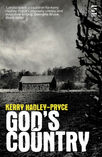A Note on Language
- Kerry Hadley
- Aug 27, 2021
- 3 min read
I am walking in Cornwall, which has been apt, and has given me plenty of thinking time. In my editing of 'God's Country' I've been particularly considering the use of language. This consideration, really, is something prompted by conversations during supervisory meetings. What might I call the 'style' of language I use? Is it something linguistically palimpsestic or is it emulating something like that? Or, is it something to do with writerly 'instinct'? For instance:

'She won’t be able to explain it, Alison that is, but from the very beginning, she couldn’t quite find the right frequency here. She just couldn’t tune in. She couldn’t catch hold of the sensation of the place, or deal with the feel of it. She’ll say she lay down with him, Guy, on his single bed. It was the middle of the afternoon and they’d never done that before, lie down like that in the day. The north and southbound rhythms of the distant M5 motorway must have sounded like the sea, but ask her, and she’ll say she lay there feeling marooned, stranded.'
It's the 'She won't be able to explain it' and 'she'll say' - phrases like that - used repeatedly. Perhaps they work as a narrative layer - another layer - between the narrative, the narrator and the reader. I have to think about this. Meantime, I've been reading Gregory Leadbetter's article 'A Note on Poetry. A Contention, An Ideal, A Credo'. http://nclacommunity.org/newdefences/2021/07/16/a-note-on-poetry-a-contention-an-ideal-a-credo/?fbclid=IwAR3AkT483Yov7mvccj8-HE5MmwAHsweMOYmTwhajEBOALYx_qem0B00QmmU
Leadbetter is, of course, a poet, and in this article, he argues that poetry (and in 'defence' of poetry) '...somehow distinguishes itself from other norms of speech and language. In poetry, language behaves and presents differently – and, as another order of language, it implicitly calls upon other orders of attention.' This, he says, is something that is odd, something unfamiliar linguistically, and it's something that, because of its difference (what he calls the 'warp or swerve from the familiar') operates on a different level in terms of creating conversation about 'what happens when language enters these altered states and becomes poetry.' He argues that, for the poet, the poetic imagination simultaneously responds to and directs aspects of language drawing attention to itself through 'the action of its form'. Where Leadbetter is concerned, poetry 'possesses transnatural force' and by changing the nature of language, it doesn't merely inform about experience, it becomes the experience itself. Most importantly: 'Each poet, each critic, can only contribute their distinct contentions, with their distinct psychological, experiential, and intellectual genealogy.' Now, I am not a poet, but when I read what Leadbetter has to say in defence of poetry, I can see that there are elements of truth, or connection with the process of writing and the language decisions made and used in 'God's Country'. I would argue that my 'prose imagination' is instinctual, responding to and simultaneously directing the form of the novel itself. Both responding to and directing this instinct links to the idea of 'flow', and in his article, Leadbetter, quoting Ben Jonson, says that the poet must be a 'perpetual student, responsible for the training (not just the exercise) of their instinct.' Applying this to the writing of 'God's Country' leads me to ask other questions: has the writing of this novel harnessed, or trained, my writerly instinct? As a 'perpetual student' has the act of writing and now editing the novel, and becoming more aware of the language? Has the form I have chosen become the experience itself - the psychogeographical experience? Leadbetter refers to the poetic imagination as having a: '...paradox of its effects: activity and passivity, the voluntary and the involuntary, presence and absence, concinnity and spontaneity, knowing and unknowing, disturbing and soothing, infecting and curing, intensifying and relaxing, summoning and exorcising, wilding and ordering, saying and not saying.' This, to me, describes the act of editing. The layers of narrative experience, to me, must be balanced thus, or else the work itself becomes simply a 'telling'. These psychoactive powers in poetry that Leadbetter speaks of seem relevant to the process of writing, but what about editing? Because the editing process ought to lean more towards the 'exorcising', being less spontaneous and more critical. Tamping down the 'curing' is the more difficult part in the editing process. More particularly, what I'm trying to do is to allow the editing process be the process of allowing the prose instinct to (perhaps) swerve (slightly) towards the poetic imagination.









Comments